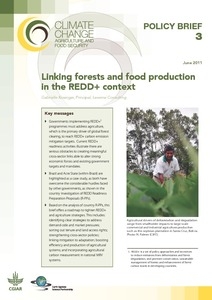Linking Forests and Food Production in the REDD+ Context
In order for REDD+ carbon emission mitigation targets to be reached, the primary driver of forest clearing globally, agriculture, must be fundamentally addressed by governments implementing REDD+ Programmes. This paper evaluates the extent to which countries participating in the World Bank Forest Carbon Partnership Facility (FCPF) readiness activities are actively linking REDD+ and agriculture policies, programmes, and institutional and governance arrangements. Based on 20 current country readiness proposals (R-PPs) submitted to the FCPF, the analysis reveals that overall, REDD+ strategies and actions generally fail to address agricultural drivers.
The paper poses a general roadmap for how countries can more adequately address agricultural drivers in their REDD+ strategies, including identifying clear strategies to address demand-side and market pressures, and how government action can influence those; sorting out tenure and land access rights; strengthening cross-sectoral policies; linking mitigation to adaption; boosting efficiency and production of agricultural systems; and incorporating agricultural carbon measurement in national MRV systems. Brazil and Acre State, Brazil, are highlighted as a case study, as both jurisdictions have overcome, at the national and sub-regional scale, many of the hurdles faced by other governments analyzed in this paper.














